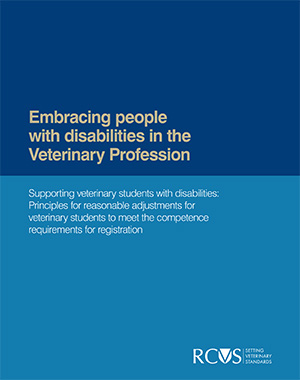-
-
- Advancement of the Professions Committee
- Standards Committee
- Audit and Risk Committee
- Education Committee
- Disciplinary Committee
- Charter Case Committee
- Preliminary Investigation Committee and Disciplinary Committee Liaison Committee
- Registration Committee
- Preliminary Investigation Committee
- Paper classification: some definitions
-
-
-
-
- About extra-mural studies (EMS)
- EMS requirements
- Information for vet students
- Information for EMS providers
- Information for vet schools
- Temporary EMS requirements
- Practice by students - regulations
- Health and safety on EMS placements
- EMS contacts and further guidance
- Extra-mural studies fit for the future
-
-
- Code of Professional Conduct for Veterinary Surgeons
- Code of Professional Conduct for Veterinary Nurses
- Contact the Advice Team
- XL Bully dog ban
- 'Under care' - guidance
- Advice on Schedule 3
- Controlled Drugs Guidance – A to Z
- Dealing with Difficult Situations webinar recordings
- FAQs – Common medicines pitfalls
- FAQs – Routine veterinary practice and clinical veterinary research
- FAQs – Advertising of practice names
- GDPR – RCVS information and Q&As
-
- Accrediting veterinary degrees
- Accrediting veterinary nursing qualifications
- Reasonable adjustments for student vets
- Health and disability in veterinary medicine study and practice
- The role of the veterinary schools and the RCVS
- Reasonable adjustments and the Equality Act 2010
- Reasonable adjustments and Day One Competences
- Examples of reasonable adjustments for vet students
- Annex
- Reasonable adjustments for student vets - summary
- Reasonable adjustments for student veterinary nurses
- Health and disability in veterinary nurse education and training
- Reasonable adjustments for students and the UK disability discrimination legislation
- Educational assessment of veterinary nurses
- Roles of key stakeholders in the application of reasonable adjustments
- Examples of reasonable adjustments for vet nurse students
- Embracing reasonable adjustments for student vet nurses - summary
- External review of the RCVS by ENQA
- Requirements for remote and online student assessments
Reasonable adjustments for student vets
This section provides guidance to support veterinary schools, students, and staff in making reasonable adjustments for veterinary students or prospective students with disabilities, helping them meet the competence requirements for registration.
 Download the PDF version
Download the PDF version
The guidance on these pages is also available as a PDF.
Download 'Embracing people with disabilities in the veterinary profession' [PDF].
On this page
The statutory responsibilities of the RCVS
The Royal College of Veterinary Surgeons (RCVS) has a statutory responsibility under the Veterinary Surgeons Act (1966) to regulate the professional education of veterinary surgeons (under the Royal Charter, this includes vet nurses).
In order to safeguard the interests of the public and animals, the RCVS sets the standards for veterinary education and ensures only those who have completed a recognised (accredited) qualification, or have passed the Statutory Membership Exam, are eligible to practise in the UK.
The RCVS accreditation of veterinary degree programmes provides assurance that standards are being met and drives the quality improvement of veterinary education. We regulate all veterinary programmes up to graduation, with a key focus on ensuring that vet schools are meeting the needs of their students.
As the professional regulator, we exist to set, uphold and advance veterinary standards, in order to enhance society through improved animal health and welfare. We believe this can best be achieved when the profession reflects our diverse society. Therefore, it should be recognised that veterinary surgeons with a disability are beneficial to the profession, bring important experience and insights, and are to be valued for their contribution to animal health and welfare.
The responsibility of vet schools
It is the responsibility of vet schools to put in place reasonable adjustments for students with disabilities.
The RCVS has produced this guidance to assist vet schools through the description of high-level principles to support consistent decision making and clarify how reasonable adjustments align with competence standards. This guidance also provides examples of different types of reasonable adjustments that could be appropriate in different cases and offered to students.
This guidance is not and does not purport to be legal advice. Vet schools should seek their own legal advice about any specific questions related to reasonable adjustments, as every case will depend on its own particular circumstances.
This guidance is also aimed at students and those applying to be students. It aims to clarify how, and to what extent, support can be put in place for students with disabilities to meet the competence requirements for registration and a licence to practice in the UK as a Member of the Royal College of Veterinary Surgeons (MRCVS).
This guidance should be considered in accordance with:
- The Equality Act 2010
- The RCVS standards for the accreditation of veterinary degree programmes
- The RCVS Day One Competences
Student vet summary
This section is also available in a condensed version for vet students, offering a clear, accessible overview of key information on reasonable adjustments during your studies.
Embracing people with disabilites in the veterinary profession - summary.
Next
Health and Disability in veterinary study and practice
Please note: this general guidance does not purport to be legal advice and is not to be relied upon as legal advice. Students and education providers should take their own advice in the particular circumstances and as required.